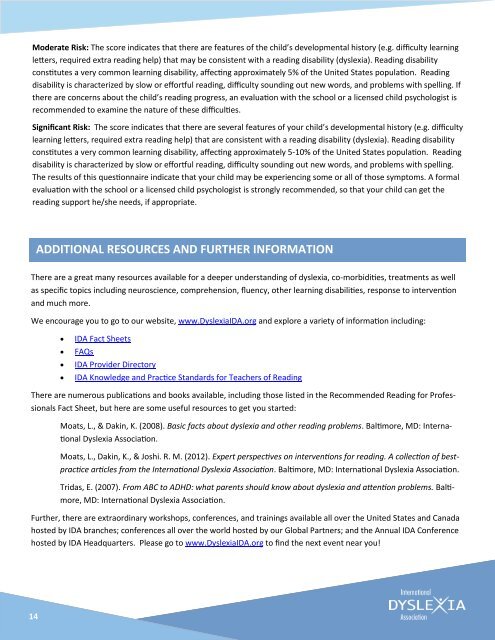Overcoming Dyslexia
Overcoming Dyslexia
Overcoming Dyslexia
Create successful ePaper yourself
Turn your PDF publications into a flip-book with our unique Google optimized e-Paper software.
Moderate Risk: The score indicates that there are features of the child’s developmental history (e.g. difficulty learning<br />
letters, required extra reading help) that may be consistent with a reading disability (dyslexia). Reading disability<br />
constitutes a very common learning disability, affecting approximately 5% of the United States population. Reading<br />
disability is characterized by slow or effortful reading, difficulty sounding out new words, and problems with spelling. If<br />
there are concerns about the child’s reading progress, an evaluation with the school or a licensed child psychologist is<br />
recommended to examine the nature of these difficulties.<br />
Significant Risk: The score indicates that there are several features of your child’s developmental history (e.g. difficulty<br />
learning letters, required extra reading help) that are consistent with a reading disability (dyslexia). Reading disability<br />
constitutes a very common learning disability, affecting approximately 5-10% of the United States population. Reading<br />
disability is characterized by slow or effortful reading, difficulty sounding out new words, and problems with spelling.<br />
The results of this questionnaire indicate that your child may be experiencing some or all of those symptoms. A formal<br />
evaluation with the school or a licensed child psychologist is strongly recommended, so that your child can get the<br />
reading support he/she needs, if appropriate.<br />
ADDITIONAL RESOURCES AND FURTHER INFORMATION<br />
There are a great many resources available for a deeper understanding of dyslexia, co-morbidities, treatments as well<br />
as specific topics including neuroscience, comprehension, fluency, other learning disabilities, response to intervention<br />
and much more.<br />
We encourage you to go to our website, www.<strong>Dyslexia</strong>IDA.org and explore a variety of information including:<br />
<br />
<br />
<br />
<br />
IDA Fact Sheets<br />
FAQs<br />
IDA Provider Directory<br />
IDA Knowledge and Practice Standards for Teachers of Reading<br />
There are numerous publications and books available, including those listed in the Recommended Reading for Professionals<br />
Fact Sheet, but here are some useful resources to get you started:<br />
Moats, L., & Dakin, K. (2008). Basic facts about dyslexia and other reading problems. Baltimore, MD: International<br />
<strong>Dyslexia</strong> Association.<br />
Moats, L., Dakin, K., & Joshi. R. M. (2012). Expert perspectives on interventions for reading. A collection of bestpractice<br />
articles from the International <strong>Dyslexia</strong> Association. Baltimore, MD: International <strong>Dyslexia</strong> Association.<br />
Tridas, E. (2007). From ABC to ADHD: what parents should know about dyslexia and attention problems. Baltimore,<br />
MD: International <strong>Dyslexia</strong> Association.<br />
Further, there are extraordinary workshops, conferences, and trainings available all over the United States and Canada<br />
hosted by IDA branches; conferences all over the world hosted by our Global Partners; and the Annual IDA Conference<br />
hosted by IDA Headquarters. Please go to www.<strong>Dyslexia</strong>IDA.org to find the next event near you!<br />
14

















